Tags
Related Posts
Share This
Q/A with Cannupa Hanska Luger
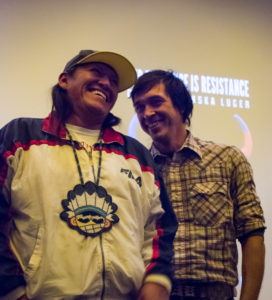
Orlando Cruiz (left) and Cannupa Hanska Luger share a moment of humor amid the serious presentation. Photo by Sasha Hill
With the recent eviction of water protectors from Standing Rock, water rights were on the minds of many students and faculty members at Santa Fe University of Art and Design when Standing Rock artist Cannupa Hanska Luger was invited to give a talk Feb. 24 in Tipton Hall. Luger is a local artist who grew up at Standing Rock. His talk “Our Existence is Resistance,” was part of the college’s Artist for Positive Social Change series and revolved around not only the importance of water and land but also indigenous identity, art as social justice and—as per the name of the event—how existence itself is resistance. While Luger’s speech was inspiring in itself, it was the audience participation also left the crowd pumped. The floor was open to audience questions and discussion and ended with a final drum performance by New Mexico indigenous performer Orlando Cruz.
After the event, Jackalope interviewed Luger about his art, sharing, and activism.
Jackalope Magazine: You talk about in your mirror shield tutorial video about growing up witnessing environmental racism. In your own words, what is environmental racism?
Cannupa Hanksa Luger: What I see is a lot of extractive resources impacting indigenous communities first. There’s only four percent of us of the global community that are indigenous and exist in the place that they’ve always existed and yet those are the places that are being hit by extractive resources processes first because there’s no voice there. That conversation is entirely revolved around tactics of marginalizing people… How could that four percent protect 84 percent of the world’s natural places and why is that our responsibility? It’s just because of where we’re at in location.
JM: What is your approach to the intersection of art and activism?
CHL: I think art in general comes from a place of ecstasy, comes from a place of emotive core and in that, all you have is your own experience to draw from. Therefore, art without intending to be so is fundamentally political. Fundamentally. I saw a need and needed to fill it. It hit close to home… Primarily I’m trying to communicate. Once you start talking, you put your politics out there.
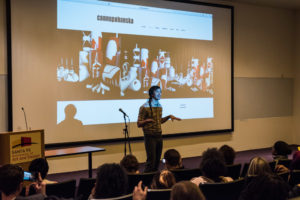
Cannupa Hanska Luger presenting his work via his artist webpage. Photo by Sasha Hill
JM: Some of the discourse around Standing Rock has been that it’s not a place you go to like you go to Burning Man. It’s not a place to explore your ‘wild, native fantasy.’ How do you respond to people who went to the camps with the wrong intentions? How do you educate people about the dangers of appropriation?
CHL: I think that conversation is fine when it comes from outside the camps, but everyone who did go, everything they carried with them, all that baggage they carried to that place… it fell away. They came and they wanted to be a part of something new but realized they were actually being absorbed into something very old. It sloughed a lot of stuff off. There’s a lot of people who didn’t do shit, didn’t know how to do shit, and existed there and were sustained by community because that’s what community does. Hopefully, the stuff that they learned there they can bring back to wherever else they are. It’s not indigenous knowledge. It’s older than people. This is some protozoa stuff. I think about all that focus on native spirituality and native culture and the appropriation of those sorts of things isn’t recognizing that native culture is exactly like our current scientific practices. Our entire culture was built out of patience and observation. That’s what we do in science these days. We just have a different language for it. It exists in a different way but once we begin to have that conversation, it will wake people up… You can’t stand in front of monsters and not recognize that you are doing something incredibly powerful.
JM: You talked during the event about how native culture used to be based on sharing but now there’s fear around losing culture. You said that we need to get back to sharing in order to heal as a country. How do you balance that need to share with the caution of not being stolen from?
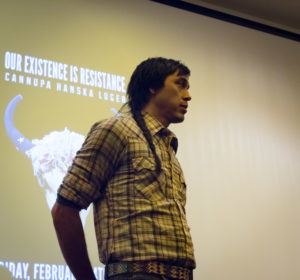
Cannupa Hanska Luger is the main speaker for the Our existence is resistance. Photo by Sasha Hill
HCL: See, that’s the tricky thing. We are where we’re at because [indigenous people] engaged with culture that was built around sharing. When the first person was like, ‘I’ll give you these silver spoons so we can have that piece of land over there,’ the conversation was fundamentally different [because it came] from the lens of not owning it. ‘You’re going to give me something so you can stand over there? OK sucker.’ But then [colonialists are] like ‘Oh, we’re building walls and you can’t come here.’ That conversation of hoarding and collecting were two dynamics that didn’t exist here [pre-colonialism]. They brought over a bunch of weird shit. I think that now all that colonial practice that happened before is perpetuated through another system. Suddenly, whether you’re native or not, you’re being treated the exact same way. There’s an entity that only takes. We share so much with these corporate bodies and they just take it. There’s not cyclical engagement. There’s no ‘thank you. Here’s this.’ It’s just ‘Gimme.’ Recognize what the power is and who is the enemy. We can do whatever we want to this enemy because it isn’t a living thing. It is not a person that we are going to subjugate and beat. It is an idea and it is a sick idea.
JM: Ideas are sometimes the most dangerous enemies.
CHL: Ideas are not subject to entropy like everything else is. It’s too ephemeral. It’s hard to bind it to something. Everything that’s happening in North Dakota and anywhere that there is extractive resources, [oil companies] are selling us on this idea of energy dependence. Humans have existed for tens of thousands of years without a lightbulb and beautifully. It’s only been a short amount of time that we got to this place so I’m not interested in decolonizing. That is falling apart anyway. I’m interested in being active and trying to indigenize people’s minds rather than decolonize them. Let’s recognize that it’s always been here. It’s not a new idea. It just worked for a long time. We just have to remember; it’s not about learning new stuff, it’s about reminding our bodies that we’re a part of this place.
JM: You talked about how working in the Native Art industry is weird. Can you talk a little bit more about that?
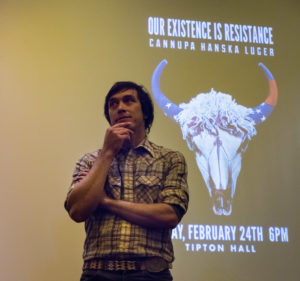
Cannupa Hanska Luger contemplates the response from audience members. Photo by Sasha Hill
CHL: The major challenging point is that there is no Native Art. It’s not separate from our lives, traditionally. The practise of making something beautiful was a way of life. It was, ‘make your life beautiful. Make the things that you carry gorgeous. Let them speak about you.’ So to turn that into a commodity and to sell it and to bind all of your culture to that…and to be taught that’s all that you’re good for [is difficult.] These Indian schools… were like, ‘OK, farming I guess is good. Let’s teach [native people] how to exist within the society that we’re building. Fuck dude, that’s really hard. They’re crafty people. Let’s just teach them art. That’s what they’re good at.’ I work in an industry that reinforces that idea politically. Native people are some of the most political whether we like it or not.
JM: On stage you got very emotional when talking about women’s rights. What is men’s responsibility to fighting for women’s rights? How do men be good allies?
CHL: Tell me! You tell me! Everyone talking on that front stage were all men and that is messed up. It’s perpetuating that same exact problem. We get platformed to talk. Traditionally within [native] communities men were more often delegates… We had clan systems where I’m from and each clan was a matriarchal system and the eldest of each clan was the voice within the community because Mom knows how to share… Guys are built different in a way. What they used us for was to engage outside of the community. So when Western folk are coming across and the first people they’re seeing are a bunch of guys… they think it’s a patriarchal society. ‘Let’s get these guys to sign papers and make decisions.’ We’ve never had that responsibility!
JM: You said in your talk that Standing Rock is not a hashtag. How do you react to that kind of fad activism that makes people think of Standing Rock as a hashtag?
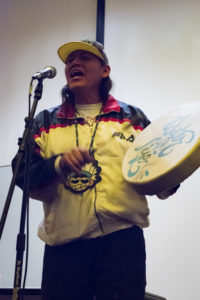
Orlando Cruiz sings his ceremony closing song. Photo by Sasha Hill
CHL: I honestly do not know the complete power of social media. I know it was incredibly useful for Standing Rock but I also know that it does turn people and places into hashtags… but I don’t know how much good that’s going to do down the road because I’m too close to it. I don’t know how far someone who is engaging in fad activism is going to reach. I don’t how much their fad and their ego influences people who made a difference. I can’t ever know whose fad activism engaged with someone who actually did good work. I’m for it. It’s better than nothing because nothing is the status quo. Engage at whatever level you’re comfortable with and know that there are other people who are going to engage deeper than you. Facilitate them. If you can’t do it directly, facilitate them. Inspire your community to make a difference.
JM: Thank you for being vulnerable on that stage with us. It’s a hard thing to be.
CHL: Is it? It’s so easy! It’s literally not clenching everything. That’s being vulnerable. Society says ‘don’t do that,’ but that’s the hard thing. The hard thing is to sustain that. Stop flexing that muscle, dude. Relax! It’s how we are. We’re all sensitive artists in the world. We all make different arts but we’re all sensitive. Remember that.
—
You can find out more about Cannupa Hanska Luger and his work at http://www.cannupahanska.com/.






 Jackalope Magazine is the student magazine of Santa Fe University of Art and Design. Building on the interdisciplinary nature of our education, we aim to showcase the talent of our university and character of our city.
Jackalope Magazine is the student magazine of Santa Fe University of Art and Design. Building on the interdisciplinary nature of our education, we aim to showcase the talent of our university and character of our city.
Wow! Great questions.. especially the last one thanking him for being vulnerable!!Amazing journalism!!